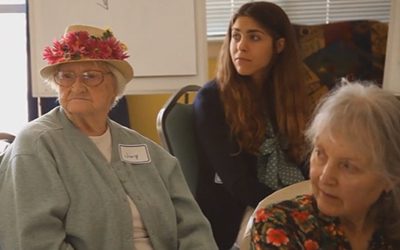Yes, I’m getting older. No, I have not retired because economic justice still needs advocates. Even if you are nowhere near becoming a respected elder, you should watch and share this film with your parents, grandparents and community leaders. The vultures are circling to plunder their hard-earned and precious income.
Viewing this film reminded me why I chose my community development career forty years ago. I can’t stand people getting ripped off.
Fleeced is an informative 27-minute documentary on the impact of financial exploitation of older adults, produced by the National Community Reinvestment Coalition (NCRC) and WFYI Productions of Indianapolis, with generous support from The Atlantic Philanthropies. It covers multiple predators stalking seniors across the country: phone scams; home equity and refinancing traps; and deposit advance loans.
First, here’s a few startling numbers that the film highlights:
• Deposits by seniors in financial institutions represent 70 percent of all deposits nationwide.
• Over 20 percent of older adults have been victims of financial fraud and abuse, which annually strips $2.9 billion from their assets.
• 7.3 million older Americans have been victimized by financial scams, with an average loss of $150,000 per victim.
Fleeced tells the story of older adults and their families who were victimized by different types of financial scams and abusive financial products. These individuals and their families transform from victims to advocates speaking out on behalf of others.
Annette Smith of California needed a small loan from her bank but was told they didn’t lend less than $5,000. She was referred to a deposit advance loan that ripped her off for $3,000 in fees over five years on that original $500 loan. Andrea Luquetta, policy advocate for the California Reinvestment Coalition, worked with Annette and notes that deposit advance loans are designed to hold seniors hostage as they end up borrowing again and again while waiting for their social security check. Annette was invited to tell her story in testimony before the U.S. Senate Special Committee on Aging. “You think you could trust your bank because they are on your side,” Annette asks. “Where did we get that idea?”
Anita Gardner, a Cleveland leader from Empowering & Strengthening Ohio People [ESOP], tried to use all her retirement savings to catch up on her mortgage payments that had been late due to a serious illness. But the lender kept sending her checks back and wouldn’t let her until ESOP helped her to regain her home. “Don’t let them get away with it,” Anita exhorts. “Make noise; silence is deadly.”
Abby Kuzma, the Indiana deputy attorney general, emphasizes that prevention is the key to limiting financial fraud and abuse aimed at older adults: “They’re looking for money and don’t care what they are doing to hurt people.”
Skip Humphrey from the Office of Older Americans at the Consumer Finance Protection Bureau stresses the need for seniors to speak out, “because when you do that you give encouragement to others to do the same. We must stop this silent crime.”
The film encourages viewers to report financial abuse to their state’s Attorney General’s office and to the Consumer Finance Protection Bureau because these scams and predatory products targeted to older Americans are likely occurring in multiple states. Organizing needs to be proactive; waiting for anecdotal stories to arise means some folks have already been fleeced. Our communities need financial advocates for our seniors.
In Chicago, NCRC is collaborating with the Northwest Side Housing Center, Gamaliel of Metro Chicago, and Woodstock Institute to convene a forum on elder financial abuse focusing on three outcomes:
• outreach to elders on avoiding financial abuse;
• bank teller training & reporting of elder financial abuse; and
• assuring credit access with reasonable fees for elders.
Misty LeBlanc is program assistant for small accessible repairs for seniors (SARFS) at my former organization, North Branch Works. She viewed the film at its Chicago premier in May and shared: “With the work I do on the SARFS program, this film hit a nerve. I was almost in tears. Fleeced was head-on in its portrayal of how unassuming the seniors are of scams. It’s very upsetting that after this older generation has worked their whole lives to obtain these assets, they only get swindled by financial institutions and phone scams.”
This film merits being shown in your organizing circles to encourage increased efforts in your community to detect, report, prevent, and enforce existing laws and rules against such fraudulent practices. View the film’s trailer.
NCRC welcomes the opportunity to engage with you to convene educational forums to inform community and civic leaders on the importance of this issue and how to prevent it, and to identify film festivals and other forums in your communities to get the film exposure.
Fleeced beat out six other finalists to receive a regional Emmy award from the National Academy of Television Arts and Science of the Lower Great Lakes Regional Chapter in the category Public/Current/ and Community Affairs. NCRC has received additional exciting news from the American Public Television that 155 PBS stations have agreed to show Fleeced in the next few months. For info on where and when, you can contact NCRC’s National Neighbors Silver director, Robert Zdenek, at [email protected].
As the Indiana family asks after sharing their heart-breaking story, “How many people have to wait for justice?” Our communities can’t afford any more elders being fleeced. It’s just not right.






Comments